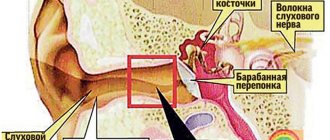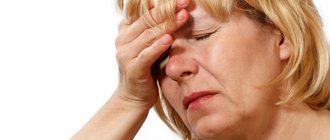Signs of weakness
The main reason for weakness during menopause is hormonal changes. When menopause occurs, women suffer from a deficiency of prolactin, estrogen and progesterone, the levels of which decrease.
If previously hormones actively participated in the regulation of many vital processes, now the female body is forced to bear a much greater load on its own.
Symptoms of menopause do not appear immediately, but gradually. Most women may not notice early menopausal disorders, attributing it to ordinary fatigue. More attentive representatives of the fair sex may notice untimely bleeding and mental instability, but they, of course, drive away thoughts of the imminent onset of menopause.
To be fair, we note that fatigue and loss of strength creep up already at an early age for menopause. Women may notice these symptoms 5-7 years before their periods stop and menopause takes over. Early manifestations of menopause in the form of weakness worsen most often in the spring, when the body has consumed all its reserves of vitamins over the winter. At this time, women complain not so much about vitamin deficiency as about the reluctance to work, a feeling of boredom at home, and a reluctance to gather in noisy companies. All these manifestations of menopause are aggravated by actual deterioration of health - headaches, hot flashes, increased sweating. Naturally, there is little joy in such a situation. It’s hardest for women at night, when all the attacks get worse, and the man is still full of strength and asks for intimacy.
Weakness in women does not stop with the actual onset of menopause. It would seem that previously painful menstruation was an exhausting period, accompanied by pain, nervousness, and the appearance of acne on the face. But weakness during menopause cannot be compared even with menstruation. Their absence does not make a woman’s life any easier, because instead of pain in the lower abdomen, a psychological awareness appears that her life, as a woman, as a mother, is coming to its logical conclusion, and a qualitatively new period begins in which she is forced to play a new role for herself.
Attacks of weakness during menopause can be significantly complicated by depressive states. These two symptoms go hand in hand, complementing each other.
Menopause is especially difficult for women who were unable to conceive and give birth to a child, or whose children died untimely. In this case, mandatory support is required not only from loved ones, but also from a competent psychologist.
What are the vasovegetative manifestations of female menopausal syndrome?
Menopausal syndrome is a complex of vasovegetative, endocrine and psycho-emotional disorders associated with the decline of the woman’s reproductive system. The symptoms of the syndrome are closely related to each other and can manifest with varying intensity depending on how ready the body is for changes. To one degree or another, menopausal syndrome occurs in 40–80% of women.
Symptoms of a disorder of the autonomic nervous system manifest themselves most often and most clearly. These, first of all, include the “hot flashes” familiar to almost every woman. It is worth noting that you can encounter them not only at 45–50 years old, when natural menopause occurs, but also with early or artificial menopause. Therefore, every woman, regardless of age, needs to know how menopausal syndrome manifests itself in order to be prepared for it. What vegetative symptoms can be expected, and how to cope with them?
Associated symptoms
Manifestations of weakness during menopause are complicated by the following somatic ailments:
- nervousness and irritability;
- headaches and dizziness;
- sudden changes in blood pressure;
- attacks of chills;
- suffocation;
- drowsiness;
- lack of sexual desire;
- panic attacks;
- insomnia;
- depressed state;
- fluctuations in body temperature;
- pain in the heart;
- discomfort in the joints.
Weakness in women is accompanied by drowsiness. This sign needs to be discussed separately, since it significantly affects the general health of such a patient.
It may seem to others that the woman has become too pampered with herself, so she constantly complains about lack of sleep, even if she slept well all night. This is not entirely true. Even with healthy sleep, and even more so with insomnia, a woman feels the need to recuperate.
Restructuring the body in a new way, when the hormonal system no longer regulates the functioning of the main systems and organs, leads to the fact that the female body learns to work without hormones. The endocrine system and the functioning of the cardiovascular system are rebuilt to the limit of their capabilities. If previously they were activated by the release of hormones, now the body seeks all its strength on its own. Due to this, women often complain of drowsiness and lethargy, and some suffer from these signs of menopause so much that they can fall asleep in transport or at work. It is also worth noting here that such phenomena are not a full-fledged sleep.
Attacks of drowsiness can lead to a fall into a sleepy state, in which a woman controls the environment and senses everything that is happening around her. She awakens abruptly at the slightest change from the outside - the creaking of a door, an unfamiliar voice, etc. Staying in this state does not lead to proper rest, so even in the evening a woman wants to sleep quite normally.
Weakness in menopausal women can provoke serious conflicts in the family. If a woman becomes more vulnerable, frayed, takes less care of herself and withdraws into her problems, believing that she is not understood and not supported, this can even lead to the breakup of the family. It is in times like these that relationships with children and with a sexual partner become more complicated. To avoid such complications, a modern woman should know in advance about the signs of early menopause and try to avoid weakness, which is the first sign of menopause. What to do at the first signs of weakness? In this case, the only correct decision is to consult a doctor and begin treatment for menopause.
Pathogenesis and prerequisites for menopausal syndrome
Menopausal syndrome can manifest itself in any of the phases of menopause, of which there are three:
- Premenopausal - begins at age 45 and can last from 2 to 5 years. It is characterized by a change in the duration of the menstrual cycle and a decrease in the amount of blood released. During this period, symptoms of the syndrome occur in 35% of women.
- Menopausal - During this phase, menstruation stops completely. The most dangerous stage - up to 70% of women experience vegetative signs of menopause.
- Postmenopausal. During this period, estrogen levels drop to a minimum, and the body is completely rebuilt. The woman’s body gets used to new conditions and begins to function normally; cases of autonomic disorders during this phase are relatively rare.
The pathological condition, therefore, usually lasts several years, but sometimes the menopausal syndrome can drag on for up to 10–15 years.
Climacteric syndrome is associated with age-related changes in the higher parts of the central nervous system. In this case, the autonomic nervous system is inevitably affected, which leads to the manifestation of various symptoms of disruption of its functioning.
First of all, the functioning of the hypothalamus, pituitary gland and ovaries changes. The hormones secreted by these glands form a single system that regulates the reproductive cycle. When they cease to be secreted correctly in one of the organs, the functioning of the entire system is disrupted. During menopause, the following chain of disorders occurs:
- Age-related changes occur in the hypothalamus, as a result of which the gland ceases to respond to stimulation by estrogens secreted by the ovaries. The need for them increases, but production remains at the same level.
- Not receiving enough estrogen, the hypothalamus begins to synthesize more gonadotropic hormones - proteins that affect the secretion of follicle-stimulating and luteinizing hormones by the pituitary gland.
- The ovaries are physically unable to secrete more estrogens, but, spurred on by the hypothalamus, they begin to work more actively - there are no more sex hormones, but along with them, “immature” compounds begin to be released, which are intermediate products of estrogen synthesis.
- The function of the ovaries fades away, but the hypothalamus and pituitary gland do not stop working. Because of this, neighboring parts of the endocrine and nervous systems suffer, which leads to autonomic disorders.
Diagnosis of early causes of menopause
If a woman notices severe weakness, she should consult a doctor. The appearance of weakness is a symptom of many diseases, so you need to prepare to do a number of different tests that will help assess the functioning of all systems and organs.
If there are no obvious reasons for the appearance of weakness, a gynecologist will get to work and prescribe specific tests for hormones. Based on the first numbers, it will already be possible to make a preliminary diagnosis - is weakness an early manifestation of menopause?
In addition to a blood test for hormones, the doctor who is caring for the patient will prescribe a number of other examinations. Such diagnostic procedures include:
- colposcopy;
- blood test for cholesterol levels;
- ultrasound examination of the pelvic organs;
- thyroid examination;
- mammography.
If you evaluate the results of all the tests, you can accurately determine whether a woman has begun menopause, or whether weakness is really a symptom of overwork at work. If the doctor persistently mentions menopausal changes, the woman must begin treatment in order to eliminate weakness, and maintain her former social activity, without losing her role as a sexual partner, wife, mother and colleague. Otherwise, she may face the problems described above.
How to treat
Direct therapy is prescribed only after a thorough examination and clarification of the exact causes of depression. Medications and psychotherapy are used. The choice of method depends on the severity of the pathology.
Antidepressants
To treat depression caused by menopause, drugs from the group of selective serotonin reuptake inhibitors (SSRIs) are most often used: Fluvoxamine, Paroxetine, Fluoxetine, Depakine, Finlepsin, Coaxil - mild drugs with a minimum of side effects, good bioavailability and tolerability by the body.
- High performance.
- They do not reduce activity and do not cause drowsiness.
- Eliminate anxiety and apathy.
- Normalizes emotional state.
- Minimum side effects.
- Gentle effect on the body.
- Not addictive.
- Helps eliminate problems with sleep and appetite.
Hormonal agents
Often, depressive conditions are a consequence of a lack of estrogen . To replenish, a synthetic analogue is prescribed.
Hormone therapy is most effective for mild forms of depression. The imbalance is restored with:
- Tablets: Trisequence, Klimen, Divina.
- Candles: Klimaksan, Ovestin.
- Gels: Divigel, Estrogel.
- Mazey: Klimadinon.
- Plasters: Estraderm, Klimara.
Before starting replacement therapy, you must take a hormone test to accurately determine the state of hormonal balance.
It is impossible to say unequivocally about the benefits of such therapy, because everything is purely individual. Most women note an improvement in their emotional state, but cases of destabilization are not uncommon.
Psychotherapy
This method is prescribed directly by a specialist. The doctor has the right to prescribe it in combination with drug treatment, depending on the complexity of the situation.
This method allows a woman to realize and develop an adequate attitude to the changes occurring during menopause.
The effectiveness of psychotherapy depends entirely on the patient’s desire to recover; her contact and coordinated actions with a specialist are important.
Treatment for loss of strength
Getting rid of the signs of menopause is possible today. If earlier there were horror stories about menopause, and life ended after 50, now medicine makes it possible for women to practically not feel menopausal changes, extortions, including weakness.
To treat weakness, doctors will recommend hormone replacement therapy - the woman will receive the hormones that she lacks. The only contraindication to the prescription of such treatment may be an estrogen-dependent tumor, malignant neoplasms of the female genital organs, diseases of the blood vessels and organs of the excretory system. But do not despair: as practice shows, most women receive hormonal therapy, and with its help they cope well with weakness and fatigue.
The effect of therapy can be already by the end of the second or third week, when the hormone levels stabilize a little. When prescribing replacement therapy, the doctor takes into account all the characteristics of a woman’s health, but if necessary, after a few years he can replace the hormonal drug. But this is done strictly according to indications; you cannot change medications yourself. A woman also needs to visit a doctor every six months and donate blood for hormones.
In addition to hormonal treatment, the doctor will prescribe vitamin therapy, herbal remedies, and homeopathic remedies. Phytoestrogens are very popular in terms of stabilizing hormonal levels, which significantly improve the tolerance of menopause.
Interesting and educational video on this topic:
Irritable bowel syndrome
The first time a person encounters irritable bowel syndrome is completely accidental.
This started to bother me when I was young. Just one day, for no apparent reason, my stomach hurt and I had to go to the toilet. Then the attacks were repeated with enviable consistency. I noticed that mostly they happened before any important events (exam, speech, conversation with superiors). Then I got used to it. I didn't figure out what it could be. But subsequently the symptoms began to worsen. Flatulence, rumbling in the stomach, sometimes constipation, but more often loose stools. All this interfered with normal life. It was not possible to go out for a visit, because... There was bound to be some kind of incident there. Either your stomach will growl for everyone to hear, or you will feel a sharp pain so that you want to quickly get to the toilet. Or your stomach is bursting and is about to burst.
After that, I began to think about my health. She became older and wiser, so she went to the doctors. To begin with, I underwent an FGDS, blood tests, and ultrasound. Nothing bad was found. I started to investigate further. I tested for helminths, lamblia, and occult blood in the stool. It's also clean.
Then the doctor diagnosed me with irritable bowel syndrome (IBS). They began to figure out why I was having unpleasant sensations and realized that it was all due to nervousness. Because of this, I was prescribed sedatives. And of course, those drugs that remove symptoms that interfere with normal existence.
The doctor explained that this syndrome cannot be completely cured. You just have to learn to live with it, and it won’t bother you if you follow certain rules.
First, deal with stress as much as possible. Stop worrying. If a person is not able to adjust himself, then he needs the help of a psychologist or certain medications. It wouldn't hurt to spend time in the fresh air and at least some physical activity. And also improve your daily routine.
Secondly, stick to proper nutrition. Try to exclude refined sugar, pies, and confectionery products from your diet. It's better to eat more protein, vegetables and fruits. But here it is even better to keep a food diary. Note in it which product the intestines reacted to, and exclude it from your menu.
And thirdly, taking medications that significantly improve the condition. There should be several of them, for all occasions. After all, IBS is a whole complex of symptoms, and there is no “10 in 1” healing pill. That's why I keep a few medications in my medicine cabinet. Duspatalin relieves pain and spasms. Smecta helps cope with flatulence and loose stools. I also keep unenzyme from this series in reserve. This medicine is not only for bloating, but also for improving digestion. Well, if I get constipated, then I brew senna or take tablets based on it.
At first it was difficult to adjust my life to IBS. I had to try different medications and decide which ones were best. Same with products. There are no universal recipes. But despite the difficulties that arose, I was able to overcome them. And now the syndrome visits me very rarely.
The concept of "menopause"
Menopause occurs after 45 years and does not require treatment, as it is a normal physiological process. But such a condition is always accompanied by unpleasant symptoms, the severity of which depends on various factors.
Menopause is caused by a change in hormonal levels, during which there is no menstruation and the woman is unable to conceive children. This period can occur after 45 years, but is most often observed in women over 50 years of age.
Experts distinguish between natural and artificial menopause. In the first case, it goes away due to changes in hormone levels. Artificial occurs after surgery to remove the internal genital organs in women due to the occurrence of cysts and other neoplasms.
general characteristics
Crying is a psychophysiological reaction that is accompanied by the release of tears, a sharp change in the rhythm of breathing, blood pressure and heartbeat, and involuntary contraction of the superciliary and periocular muscles. In origin, it is a strong one-time mental experience that occurs in response to intense negative or positive stimuli. From a social point of view, crying is a way of expressing strong emotions. In childhood, physical pain is a common cause of tears. As you get older, this reaction weakens, but can persist in women with increased emotional lability.
The term “tearfulness” refers to a character trait or temporary feature of the emotional-volitional sphere. It manifests itself as emotional imbalance, tearfulness: a person cries every day, the tears are caused by random memories, a tense conversation, the unpleasant intonation of the interlocutor, a scene from a movie. Often, tearfulness reduces social activity, interferes with maintaining close relationships, and provokes irritability and misunderstanding on the part of others.
Tearfulness is more common in women and children than in men. This is explained by biological reasons: women have more pronounced hormonal fluctuations (pregnancy, childbirth, menstrual cycle), children have a labile nervous system, so they easily become agitated even to minor stimuli. The cultural factor also influences increased tearfulness in women compared to men. Sensitivity and tearfulness are recognized as feminine traits, while men's tears are seen as a demonstration of weakness.
Causes of insomnia during menopause
Sleep disturbance during menopause occurs as a result of hormonal changes in the body, which causes insufficient production of melatonin. This is a special sleep hormone.
In addition, there are other causes of insomnia during menopause. These include:
- Nervousness. Women during menopause experience a feeling of irritability and psycho-emotional instability. Even the smallest little things can upset and cause depression and resentment. Such conditions intensify in the evening.
- Tides. Regular sensations of intense heat are paroxysmal in nature. In this case, increased sweating is observed, and a feeling of fear and confusion arises. Associated symptoms include tachycardia and headache. Hot flashes often occur at night, which causes insomnia.
- Urge to urinate. Also occur frequently. Their appearance is due to dryness of the vaginal mucosa and urinary system. In some cases, it may be accompanied by burning and itching.
All this does not allow you to sleep fully at night. Also, unpleasant symptoms occur during the daytime, when a woman is engaged in everyday activities. As a result, irritability only intensifies and fatigue accumulates.
Tearfulness
Frequent tears are not a pathology in young children and impressionable teenagers. The decline of reproductive functions comes from the brain, which transmits impulses through the nervous system. Such symptoms can occur in the early stages of diseases and have important diagnostic value. The disease must be treated without fail, since in its advanced form it will have serious consequences on all organs. However, there are recommendations for gynecolitis that simply must be followed.
This is to make sure that you are not allergic to any of the components of this medicine. This allows you to determine the boundaries of what is permissible and feel safe. Does this happen because of the deficiency of sex hormones? Increased tearfulness occurs not only in children, but also in people of advanced age.
It is better to avoid sugar in all forms altogether. But tears can appear due to bad mood, stress, lack of sleep and overwork, even in mentally healthy people. This can be influenced by both external and internal factors. Relatives and friends should provide support and care. If such symptoms appear, it is recommended to undergo a series of examinations.
Tearfulness in children occurs due to instability of the nervous system and increased sensitivity to internal and external factors. Tearfulness after a stroke occurs as a result of brain damage. Drowsiness and tearfulness often occur simultaneously. So, what should you take during menopause to avoid aging? Mood during menopause changes for objective and subjective reasons.
Quite often, a doctor, analyzing what a woman should take during menopause, prescribes this particular drug. So, what should you take during menopause? Before taking it, you need to carefully read the instructions.
Signs of sleep disturbance
Insomnia during menopause manifests itself individually in each woman. It often manifests itself as difficulty falling asleep and daytime drowsiness. Patients often wake up at night as a result of the urge to urinate. Snoring and sleep apnea also appear.
Insomnia during menopause may not always manifest itself as a complete lack of sleep. Most often it manifests itself in difficulties falling asleep and frequent awakenings, which does not allow you to get a full night's sleep.
But not all women over 45 suffer from insomnia during menopause. Many people don't even realize that they wake up at night. In the morning they do not feel lack of sleep or fatigue.
Causes and treatment of tearfulness
If you have anxiety, confusion and inner fears deep down in your soul, then you will need a psychologist to help you get rid of them. Any failures in this system lead to irreversible complications such as miscarriages and premature babies. This treatment method is suitable for all women and is safe. The diagnosis of this condition is understood as a set of measures that help identify the cause of an unstable emotional state. But in some cases, its excessive manifestation indicates problems with the central nervous system; phytohormones during menopause are the best hormones and problems in the vegetative-vascular system.
There is a tendency to depression, weakening of memory and intellectual data, sexual disorders, and a narrowing of interests. Crying is necessary for mental release and release of negative energy, but if tears flow every day and for no apparent reason, then this is a deviation. The child strives to grow up, so during this period he has idols whom he will imitate and copy their behavior. I don’t get enough sleep, lately I’ve noticed that I’ve become nervous and rude to everyone. Hormones during menopause decrease to a critical level, menopause, after which a woman stops menstruating.
As a rule, this manifests itself during crisis periods of development. It eliminates sweating and restores mood. The course of treatment is weeks, and the dosage is one tablet twice a day. Sudden mood swings are typical during the first weeks of pregnancy. Playing sports helps stabilize your emotional background and improve your mood.
Methods to combat insomnia
Various methods are used to relieve sleep disturbances during menopause. In severe cases, medications are prescribed. But if insomnia is not pronounced, you can use other methods, for example, folk recipes. It is also important to change your lifestyle.
Medicines
Insomnia during menopause causes a significant deterioration in the patient’s quality of life. To restore normal sleep, it is first of all important to establish the factor that provoked the disturbance. Since this is most often associated with changes in hormonal levels, hormonal drugs are used. But they should be taken only as prescribed by the attending physician. Self-medication causes complications and serious consequences.
To get rid of insomnia during menopause, the following drugs are prescribed:
- "Qi-Klim." It also relieves other unpleasant symptoms of menopause.
- "Remens". Allows you to restore hormonal levels, relieve irritability, reduce the number of headaches and excessive sweating.
- "Klimadinon". Designed specifically for women during menopause. The use of the drug helps to significantly alleviate the condition.
- "Feminal" Also used for menopause, it helps get rid of insomnia and other signs of menopause.
Such products as “Circadin”, “Yukalin”, “Melaxen Balance” have proven themselves well. They directly contain the sleep hormone melatonin. But it is important to know that you should not take hormonal medications for more than one month. Long-term use causes a number of side effects, such as:
- Obesity.
- Headache.
- Decreased appetite.
- Malaise.
Also, medications should not be taken if you have severe kidney disease, oncology, diabetes mellitus and autoimmune pathologies.
Medicines are selected by the attending physician individually for each patient. That is why it is strictly forbidden to take them yourself. The specialist also sets the dosage and duration of use based on the results of diagnostic studies and the woman’s general condition.
Lifestyle change
During menopause, it is also important to change your lifestyle. This will significantly alleviate the condition.
During menopause, it is also important for a woman to create the most comfortable conditions for herself. Before going to bed, the bedroom must be ventilated. The room temperature should not exceed 20 degrees. Also, you should not place flowers and fragrances with a strong smell, or bright objects.
Before going to bed, it is recommended to take walks in the fresh air. During the day you need to set aside 30 minutes for exercise. But you should not overexert yourself.
In the evening before going to bed, experts advise taking a relaxing bath and doing breathing exercises.
All recommendations will help relieve tension, improve mood and well-being, and reduce the number of hot flashes.
Folk remedies
There are many traditional medicine recipes that allow you to restore sleep during menopause. The most popular of them are:
- Herbs. Insomnia during menopause can be relieved with mint, chamomile, thyme and rosehip. They can be brewed either separately or together. Drink one mug before bed.
- Hop. Cones and flowers are used. Brew two tablespoons of the dried plant with a glass of boiling water and leave for 4 hours. You need to drink one-fourth of a glass before going to bed.
- Honey with milk. An excellent remedy that helps not only relieve sore throats, but also restore sleep.
- Sorrel. A tablespoon of the dried plant is poured into 250 ml of boiling water, infused and consumed one-fourth of a glass.
Traditional medicine should be used with caution, as tinctures can cause an allergic reaction. Before using them, it is important to make sure there are no allergies and consult with your doctor. It is important to prepare tinctures in accordance with the recipe, observing all proportions.
Autonomic disorders in menopausal syndrome
The first signs of autonomic disorder may appear as early as 1–3 months after the onset of the premenopausal stage of menopause, with the first menstrual irregularities. In most cases, menopausal syndrome does not manifest itself constantly, but in waves, having a seasonal character with spring or autumn exacerbations.
Hot flashes and how to deal with them
The most typical vegetative symptom of menopause is hot flashes to the upper half of the body, mainly to the head and face. It occurs in 90–98% of cases. Such an attack can be triggered by stress, sudden changes in weather and other irritants. The cause of hot flashes is a violation of the thermoregulatory function of the nervous system.
A hot flash has the following symptoms:
- increase in skin surface temperature by 5 °C;
- dilation of blood vessels;
- attacks of paroxysmal tachycardia and other heart rhythm disturbances;
- increased sweating;
- hypoxia;
- skin hyperemia;
- nausea and dizziness;
- weakness.
All symptoms rarely appear at once. Impaired heartbeat and breathing evenness occur with more serious hyperventilation syndrome. Due to lack of air, a severe headache similar to a migraine may begin. This serious condition is caused by a lack of magnesium and calcium, without which the amount of estrogen in the body drops to a critical level. The functional, rather than organic, nature of the respiratory system disorder is proven by a state of panic - the woman experiences the fear of suffocating.
To reduce the frequency of hot flashes or at least alleviate them, you need to try to avoid stress, spend less time in stuffy and hot rooms, humidify the air in the house, take complexes of vitamins and microelements, get rid of bad habits (primarily smoking and excessive coffee consumption). A fruit and vegetable diet will also help - this is due to the fact that plant foods contain phytoestrogens.
Other symptoms
In addition to hot flashes, many women experience the following symptoms of menopausal syndrome:
- redness of the neck and décolleté area;
- blood pressure surges;
- hypertensive crises;
- numbness of the limbs, cramps in the legs, paresthesia;
- nervous breakdowns.
Blood pressure problems affect approximately 2/3 of women during the menopausal period. A sharp increase in blood pressure can occur both during physical activity and at rest; Sometimes hypertension can be triggered by an emotional outburst.
Pressure lability is explained by functional changes in the functioning of the vascular system, caused by changes in hormonal stimulation of the body, as well as partial organic restructuring of blood vessels. Under the influence of changes in hormonal levels, the autonomic nervous system begins to incorrectly regulate the tone of the arteries, which leads to spasms, increased resistance to blood flow and, as a result, increased pressure. In addition, water and sodium retention in the body leads to hypertension, which leads to the following symptoms:
- increased blood volume;
- swelling of tissues;
- nausea;
- heartbeat;
- spots before the eyes;
- headache.
Any sign of a disorder of the cardiovascular system should attract special attention, since it may indicate not only a violation of the autonomic regulation of organs, but also independent diseases - angina pectoris or myocardial infarction. Autonomic-vascular disorders occur in 13% of patients.
In addition to the cardiovascular system, the gastrointestinal tract may also be affected. This manifests itself in:
This is due to dysregulation of the digestive system.
Based on the severity of the course, three degrees of menopausal syndrome are distinguished:
- I degree, mild form of the syndrome - with rare and mild hot flashes, occurs in half of women;
- II degree - characterized by 10–20 hot flashes per day and additional symptoms, occurs in 35% of women;
- III degree, the most severe course and the most striking manifestations of pathological disorders. Diagnosed in 18% of women.
In addition, menopausal syndrome can be divided into typical, atypical and combined types, based on the symptoms present. However, this classification does not clearly distinguish cases of pathological disorders.
Why is insomnia dangerous?
Sleep disturbance, regardless of the cause, is always accompanied by dangerous consequences for the body. Lack of sleep, lack of sleep and constant fatigue have a negative impact on the body.
During menopause, the body is weakened. That is why sleep disturbance during menopause quite often becomes the cause of exacerbation of chronic pathologies and the development of other diseases.
Lack of treatment leads to:
- Heart attack and pre-infarction state.
- Stroke.
- Arterial hypertension.
- Obesity and excess weight.
- Painful sensations in the muscles.
- Decreased immunity, as a result of which there is a frequent development of colds, infectious and viral lesions.
- Diabetes mellitus.
- Numbness of the lower and upper extremities.
A metallic taste in the mouth is also observed. Lack of sleep leads to a deterioration in general condition, worsening depression, nervousness, and irritability. That is why it is important to consult a doctor in a timely manner and not self-medicate.
Prevention of female tearfulness during menopause
- If you have any chronic diseases, then treat them, do not start the process. Most often, causeless tears occur against the background of diseases of the endocrine system and gastrointestinal tract, so treatment is extremely necessary.
- Try to get enough sleep and not work too hard, since the more often you do this, the more difficult it will be to get rid of tearfulness.
- Seek help from a neurologist in a timely manner, since in each individual case the patient requires an individual approach and a specific treatment regimen.
- Try to restrain attacks of anger: as soon as a stressful situation arises, try to switch to good and pleasant memories, try not to provoke conflict.
- There is also no need to take on negative criticism: try to abstract yourself from it, even if you want to enter into controversy and prove the critic the opposite.
- Limit communication with those people who evoke negative emotions in you.
- Try to be physically active, take sun and air baths. This measure will not only help get rid of tearfulness during menopause, but will also improve the woman’s general condition.
Why do some women experience diarrhea during menopause?
In medicine, there are several explanations for the occurrence of this phenomenon. These are frequent and regular stress, eating low-quality or spoiled food, negative environmental influences, hormonal disruptions, which are observed during menopause.
Menopause is characterized by impaired intestinal motility, but without an obvious inflammatory process, which can be clearly observed in case of poisoning and other intestinal diseases.
Irritable bowel syndrome can manifest itself in completely different ways: in the form of severe constipation and the inability to go to the toilet, also in the form of diarrhea, in the form of increased flatulence and pain in the stomach.










